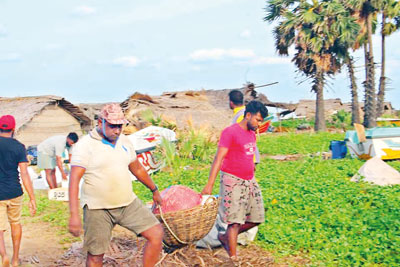News
Use of banned fishing methods endanger livelihoods
On Monday night, the day after the Fisheries Minister Wijith Wijayamuni Zoysa assured Mullaitivu fishermen that illegal fishing will not be allowed at the expense of traditional fishermen, local fisherfolk stopped a boat with a group of fishermen ready to go fishing using high powered lights — a fishing method prohibited by the Fisheries Ministry.

The fishermen leaving their temporary fishing huts in Mullaitivu. Pic by T. Thayalan
Hours later, seven fishing huts belonging to local fishermen were burned down by unknown persons along with millions worth of fisheries resources. A temporary shelter was also completely damaged. The local fishermen alleged that fishermen who come from Trincomalee, Puttalam and Negombo were behind the incident as local fishermen were up in arms in recent times against any type of illegal fishing.
Two days later, three fishermen were detained over the incident and the fishermen who were engaged in illegal fishing practices were arrested. The fishermen decided to leave their temporary fishing huts in Mullaitivu to the south where they live.
An official from the Fisheries Department said that 25 conditional fishing permits to use purse seine nets – a prohibited fishing method — were suspended until a committee recommended the next course of action. Minister Soyza also directed officials to submit a report to protect the livelihood of local fishermen.
Fishermen allege that fishermen from Puttalam, Pothuvil, Pulmoddai in Trincomalee come to the waters around Kokilai, Naayaaru and Kokkuthoduvaai of Mullaitivu to fish, and that they use illegal methods such as dynamite in the deep seas and fish near coastal areas, which is banned by the Fisheries Ministry.
Thirugnatheepam Anthony, president of Mullaitivu district Fisheries Cooperatives Federation told the Sunday Times that the livelihood of more than 5,200 small-scale fisher families have been affected severely due to illegal fishing by over 200 fishermen from various areas. “Our issue has not been resolved completely yet, but we will take up the matter when new fishing licenses are issued early next year,” he said.
Mr Anthony noted that Fisheries Department officials and the navy too have failed to act against illegal fishing practices when complaints are made.
He recalled a recent incident where a group of local fishermen took the law into their own hands when they tried to capture fishermen who were engaging in illegal fishing in mid sea and tried to bring them to shore for legal action. “These actions further angered our community and led to many problems among our fisher folk,” he said.
Fishermen who use illegal methods not only cause severe harm to the marine resources but also to the limited fish populations small-scale fishermen cultivate near the coastal area. Various methods of illegal fishing activities such as purse seine, dynamiting and light coarse fishing methods have been carried out at the expense of their livelihood.
Mullaitivu fishermen allege that those who engage in purse seine fishing come closer to shore in the night with big lights to attract fish. Once the fish – including the breeding fish banks – are lured, they use dynamite in mid-sea to kill them to use as bait for sought-after big fish varieties. Small-scale fishermen closer to shore are left with nearly nothing as the fish bank is either dispersed or depleted.
Responding to allegations by local fishermen suggesting that the Regional Fisheries Department failed to act against those fishermen from local and other districts who engage in illegal fishing, a senior official said that the department has limited institutional and human resources.
The senior official said on condition of anonymity that his department is short-staffed with just two fisheries officers assigned to cover an 83 kilometre stretch of Mullaitivu shore and four lagoons that come under its purview.
“We lack adequate resources to combat illegal fishing on land and in the ocean. We have to depend on the navy heavily for complaints of illegal fishing in the deep seas.
There have been two new appointments of fisheries officers recently, but that’s not enough,” the officer said.
According to the Disaster Management Centre unit at the Mullaitivu District Secretariat, the human-made disaster cost Rs 3.5 million worth personal property and fishing resources of local fishermen.
Immediate disaster relief assistance was given to nine families whose fishing huts were damaged completely due to fire. DMC officials in Mullaitivu said that a report will be handed over to ministry shortly.
| Officials clueless on lights law The Fisheries Department officials in Mullaitivu were clueless when it comes to determining under which law the fishermen who were arrested for illegal fishing using light resources should be held accountable. There is no clarity in regulations on illegal fishing. Some 27 fishermen in eight boats were arrested by the navy on Tuesday in Mullaitivu along with generators used as a source for high powered lights and banned fishing nets. All arrested fishermen were from Negombo, Trincomalee and Puttalam. According to existing regulations, using power light sources for Surukku type of fishing is banned but the regulations do not mention use of power lights with traditional fishing methods. | |

